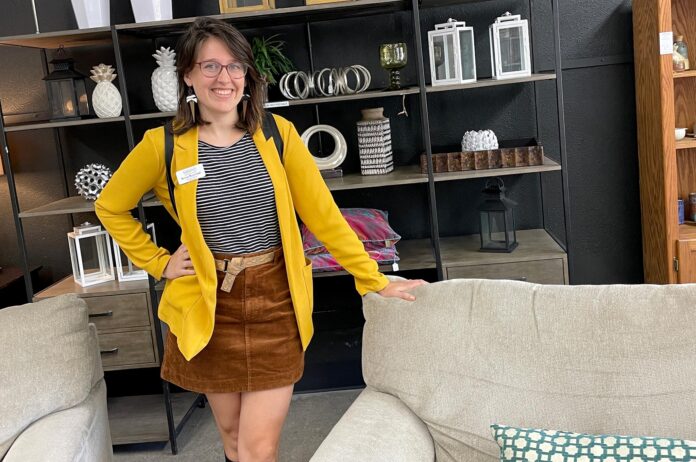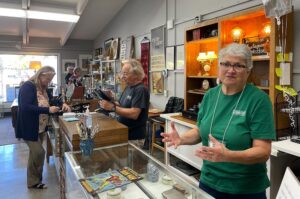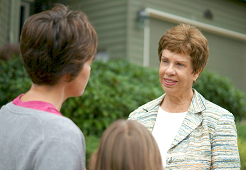
Community Warehouse welcomed customers back to its Tualatin Estate Store in September after a 9-month closure to repair damages from flooding last winter, including repairs to its roof.
Its showroom is once again packed with mid-century and modern furniture, dishes, rugs, and art at thrift store prices.

“We’re able to sell this great furniture at outrageous prices,” said Paul Lamberti, who works part-time in the store. “Community Warehouse is a great organization.”
Revenue from the thrift store at 8380 SW Nyberg St. partially funds Oregon’s only furniture bank.
The non-profit fills a gap in social services by providing donated home furnishings at no cost to people moving into new housing.
“If Community Warehouse didn’t exist, there wouldn’t be funding for people moving out of homelessness or other situations into housing to receive furniture,” Executive Director Anna Kurnizki said. “People would be moving into empty homes.”
Nationwide, there are only about 120 such services. Community Warehouse is the only one in Oregon.
It’s powered by a small staff and volunteers who collectively donate about 5,000 hours annually.
The organization, which has another retail shop and warehouse space in Portland, recently added a third warehouse in Gresham in partnership with Metro and ReClaim NW, making it the only furniture bank in the country with three locations.
Still, space is a continuing obstacle as volunteers play an ongoing game of furniture Tetris, making room for donated couches, chairs, mattresses, tables, and other items, then moving them quickly into the homes of clients to make way for more.
Demand has increased 150 percent since the start of the pandemic in early 2020, meaning Community Warehouse needs an ever-increasing supply to keep pace with client needs.
According to a year-end report, in 2022, more than 5,000 people used the service to furnish homes in multiple counties, with some deliveries reaching as far south as Salem.
“We serve about 60 families a week that are coming out of domestic violence situations, transitioning out of homelessness, out of incarceration, aging out of foster care, people who had a fire in their home and lost everything, folks who are coming out of an extended medical leave, refugees and immigrants,” Kurnizki said. “We’ve been serving a lot of Ukrainian Refugees in the last year.”
To accomplish that, Community Warehouse partners with outside social services agencies that use grant funding to cover a $150 fee for clients to “shop” the warehouses at no cost, selecting their furnishings.
Allowing people to choose, rather than just providing items, is paramount to its mission.
“Lots of people are going through things where they don’t have a lot of choices,” Kurnizki said. “Dignity is an important part of the experience.”
They’re averaging about eight deliveries a day, with the Tualatin warehouse serving both Washington and Clackamas counties. Donations are distributed through the warehouse where they were received, and furnishings that come into the Tualatin center mostly fill the homes in Washington County.
The organization has its roots in a 1990s collaborative effort of local agencies to help resettle Russian refugees spearheaded by Jewish Family and Children’s Services, which started a community warehouse collection of furniture and household items.
As the flow of refugees slowed, some agencies recognized the local need for people coming out of homelessness, escaping domestic violence, or setting up a new household after divorce.
“It became clear that there was still a huge need for it in the community, so the volunteers who had been working on keeping that warehouse going ended up getting together and incorporating Community Warehouse as a 501-C3 non-profit in 2001,” Kurnizki said.
It recently contracted with Washington County to serve 500 households through 20 partner agencies with Supportive Housing Services funding. The agreement agencies refer clients to Community Warehouse without furniture or delivery fees.
Individuals without a referral pay $150 to “shop” the warehouse.
With the support of another grant, Community Warehouse is picking up donated goods through the end of 2023 for a reduced fee. The pick-up service, usually $80, is currently $20.
Retail customers could do a complete living room makeover for a few hundred bucks by shopping the estate stores, but most donated goods go directly to people in need.
“(We) sell a small percentage of donated items to help raise funds for the organization,” Kurnizki said.
Combined sales from the Portland, Tualatin, and virtual stores totaled $736,636 in 2022, accounting for nearly one-third of the non-profit’s total revenue. Another third comes from grant funding, with events and private donations filling in the rest.
Kurnizki estimates lost sales from the Tualatin store closure added up to a six-figure hit for the non-profit.
The warehouse, which occupies most of the square footage in the same building, was not damaged and remained open during repairs.
The Estate Store, 8380 SW Nyberg St, is open 11 am- 4 pm Thursday-Saturday. All items are 20 percent off on the third Thursday of every month. To schedule a donation pick-up or drop-off, visit communitywarehouse.org.

















